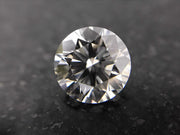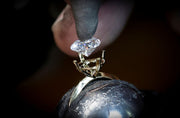Photo: Joshua Kissi
Ethos
February 4, 2021
Aether Diamonds, the first diamond brand in the world to use carbon capture technology to create sustainable diamonds, can now add certified B Corp status to its credentials.
"Achieving B Corp status will offer additional validation for how groundbreaking and impactful Aether’s technology is,” Robert Hagemann, Co-Founder and CMO of Aether Diamonds, told Ethos via email.
“Being counted among the ranks of so many other companies who are committed to making the world a better place will give our brand a community in which it can grow, and show to our consumers our commitment to responsibility in every facet of our business.”
The company, founded in 2018 by Ryan Shearman and Daniel Wojno, along with Hagemann, was the first to use atmospheric carbon to create its sustainable diamonds. Not only does this help to solve the climate crisis by removing carbon from the air—a technique also employed by companies like LanzaTech to produce sustainable textiles and perfumes—but for the diamond industry it offers assurance there are no human rights violations. Even with the Kimberly Process, human rights issues still persist across the industry; that’s not the case with manufactured diamonds.
But it’s Aether’s big footprint for carbon removal that has been its calling card. Each carat sold equals 20 metric tons of CO2 taken from the atmosphere. The company says that’s equal to offsetting the average American’s carbon footprint by 1.25 years.
The B Corp status underscores the company’s efforts; the certification isn’t easy to achieve. Out of more than 100,000 companies that have applied for it in the last decade, approximately only 4,000 have achieved it.
That number has been steadily growing in recent years with companies like Brad Pitt’s Enroot, Maker’s Mark, Aera, and Chloé all earning their B Corp status just in the last year.
The increase in companies both applying and earning the mark speaks to the shifting marketplace and the consumer demand for ethical and sustainable companies. Aether is positioned at the forefront of that shift in the jewelry segment.
Aether CEO Ryan Shearman tells Ethos that the company’s proprietary manufacturing process is demonstrably better for the environment than other diamond production methods. “Being able to support this with strong empirical evidence helped us get through the arduous B Corporation assessment process,” he says.
New world diamonds
The evolving diamond industry speaks to evolving consumer values; a recent survey by diamond giant De Beers found consumers, particularly Millennials and Gen Z, were more willing to support sustainably sourced or produced diamonds and even pay a premium for products that could offer traceability and verification that the products were ethical and responsible.
“It’s really about the impact people want to have on the world and the future we all envision for ourselves,” Hagemann says. “The traditional diamond industry has been disastrous for the planet, and it’s had a huge impact on climate change and the communities and ecosystems surrounding mining sites.,” he says.
According to Aether, on average, for every one carat that is mined from the ground, up to 250 tons of earth are removed, 127 gallons of freshwater are used, billions of gallons of water are contaminated with acid mine runoff, 143 pounds of air pollution are emitted, and countless gallons of fossil fuels are consumed.
“Not only that,” says Hagemann, “but at least 60 percent of mined diamonds sold in the U.S. have problematic ties to military governments and corruption. By producing the world’s first diamonds from air, and the only truly sustainable diamonds in the market, our goal is to reverse the damage done to the planet and to stop the human rights and social issues that pervade the traditional diamond industry.”
Aether is not alone in the manufactured diamond market. The Leonardo DiCaprio-backed Vrai just opened its first flagship store in Los Angeles last year. Brilliant Earth, which focuses on lab-grown diamonds as well, saw 2020 sales total $251.8 million, up from $201.3 million in 2019, according to MarketWatch.
The recently revived Oscar Massin jewelry label is reimagining the 19th-century jeweler’s designs with lab-grown diamonds and recycled metals. It’s a guiding principle for Frédéric de Narp, former CEO of Swatch Group’s Harry Winston, and Coralie de Fontenay, a longtime executive at Richemont’s Cartier, who are behind the brand’s relaunch. “We want to give life to these precious brands, while redefining the codes of the industry,” De Narp told The Business of Fashion.
Sustainable luxury
Aether is also breathing new life into the industry at large and hoping to redefine what luxury jewelry means. While the leading luxury brands including Cartier, Tiffany & Co., and Van Cleef & Arpels, all say they won’t use manufactured diamonds, customers want then, and for Aether it’s more than just an eco alternative. It makes a better world more accessible.
“[W]e think our perspective on sustainable diamonds as they relate to love is important,” Hagemann says. “Historically, the diamond industry has often focused on the terms ‘engagement,’ ‘wedding,’ and ‘bridal’ when referring to the jewelry pieces meant to be a part of the union of two humans. At Aether we like to use the word ‘commitment’ instead, because it’s a much broader word,” he says.
“It encapsulates the idea of a bigger love and the vision we have for the future. Commitment encompasses both the specific and the broad, the now and the later, the great and the small,” Hagemann says.
“In a world where everything can often feel uncertain and as if the ground beneath one’s feet is too frequently shifting, commitment is our anchor and our lifeline to someone or something which holds the promise of being steadfast, reliable, and dependable,” he says.
Hagemann says that commitment can refer to a marriage, civil union, renewal of vows, or a spiritual ceremony, or even something more personal like making a vow to your future self.
“The possibilities are endless,” he says, “and yet they all have a positive viewpoint in some way. What we love most is that it always means committing to building a better future.”




